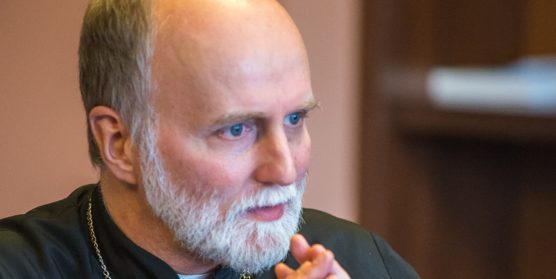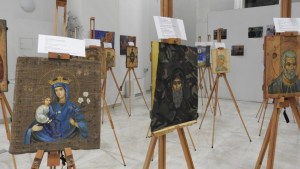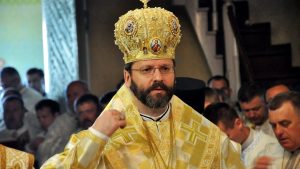The University of Notre Dame will recognize the plight of Ukraine in its defense against Russia this spring when a Ukrainian-American bishop will deliver its 2022 commencement address.
Metropolitan Archbishop Borys Gudziak of the Ukrainian Archeparchy of Philadelphia will deliver that address May 15 and receive an honorary degree from the university.
“We have previously honored Archbishop Gudziak for his work as leader of the Ukrainian Catholic University as a center for cultural thought, for his Christian witness and for the formation of a Ukrainian society based on human dignity,” said Father John I. Jenkins, Notre Dame president, in announcing the honor. “We now further recognize him as he speaks forcefully and eloquently in support of the Ukrainian people and in opposition to the Russian invasion of his ancestral homeland.”
Archbishop Gudziak was born in Syracuse, New York, the son of Ukrainian refugees. He returned to Ukraine later in life to start the Institute of Church History in Lviv, collecting oral histories of Catholics who had suffered for their faith during the Soviet years. Eventually, he organized what would become the Ukrainian Catholic University (UCU) in Lviv, the only Catholic university on the former territory of the Soviet Union.
Fr. Jenkins added, “The students, faculty and staff at Notre Dame have demonstrated continuing solidarity with Ukraine over this past month, and I know that they will benefit from and appreciate hearing the words of Archbishop Gudziak at our graduation celebration in May.”
“Pray, stay informed, help”
Gudziak has been outspoken since the Russian invasion of Ukraine started on February 24. Earlier this month, he commented: “Ukraine has won this war morally. Today the whole world is united around Ukraine. The witness of Ukrainians, their biblical David vs. Goliath struggle, has inspired and given new purpose to a fragmenting Europe. It brought together the North Atlantic partners. This moral foundation is what Jesus preaches, what the Church is called to live. The truth of communion and justice, rather than violence and war, is God’s will for us. God’s truth will prevail, but the Via Crucis often entails great suffering. This Lent we see and experience Christ’s passion, crucifixion and resurrection in a new way.”
He encouraged Americans to pray, stay informed and provide help.
“Ukraine was not a threat to Russia,” he said. “In 1994, Ukraine was the first country in history to unilaterally disarm its nuclear arsenal. The real threat is the spirit of democracy, freedom of the press, the vibrant civic society that developed in Ukraine. That ‘virus,’ if passed to Russia, would create great danger to an autocracy, a kleptocratic oligarchy, which (Russian President Vladimir) Putin runs and is fostering in neighboring countries and on other continents.”
Notre Dame and Archbishop Gudziak had already known one another because of the university’s interest in Eastern Europe. At a June 29, 2019, ceremony in Lviv, Notre Dame and UCU signed a memorandum of understanding for the two institutions to “develop collaborations and exchanges in fields of shared interest and expertise.” Initiatives already have included Notre Dame’s Nanovic Institute for European Studies hosting six visiting scholars from UCU, 18 leaders from UCU graduating from the Catholic Leadership Program created by the Nanovic Institute and Mendoza College of Business, and Notre Dame Law School supporting a consortium of Catholic legal scholars in Central and Eastern Europe. UCU is also a founding member of the Catholic Universities Partnership initiated by the Nanovic Institute in 2003.
At the 2019 ceremony in Lviv, Fr. Jenkins also presented Gudziak with the Notre Dame Award, bestowed on “men and women whose life and deeds have shown exemplary dedication to the ideals for which the University stands: faith, inquiry, education, justice, public service, peace and care for the most vulnerable.”
Martyrs and marginalized
Founded in 2002, UCU is built on the “pillars of the martyrs and the marginalized” — those who suffered and died under communist repression, and the intellectually disabled who too often exist on the margins of society, both of whom Gudziak considered essential to rebuilding trust in Ukrainian society and who were virtually invisible under Soviet rule.
Influenced early in his life by Rev. Henri Nouwen and his devotion to people with special needs, Gudziak is especially admired for his creation of the Emmaus Center on the UCU campus, a place where people with developmental disabilities and their families receive spiritual support and share their lives with students.
In a Ukrainian Weekly story, Gudziak said he considers the developmentally disabled “professors of human relations. … We need the gifts they have. They don’t care if you’re a rector, a doctor or how rich you are. What they force us to confront is the most important pedagogical question of all: Can you love me?”
Gudziak moved to Ukraine in 1992 and was ordained to the priesthood six years later. He was named vice rector and then rector of Lviv Theological Academy, the institution that in 2002 transformed into UCU.
In 2012, Pope Benedict XVI appointed him head of the eparchy serving Ukrainian Catholics in France, Belgium, the Netherlands, Luxembourg and Switzerland. He is the author of more than 50 papers on the history of the Church, theological training and other topics, and in 2018 received an honorary doctor of humane letters degree from Syracuse.
Pope Francis in 2019 appointed him archbishop of the Archeparchy of Philadelphia — which, in addition to Philadelphia, includes the District of Columbia, Virginia, Maryland, Delaware and eastern Pennsylvania. He is the Ukrainian Catholic Church’s highest-ranking cleric in the United States, known as the metropolitan. He remains president of UCU and chairman of the board and is a member of the permanent synod of the Church, which meets four times annually, usually in Kyiv.
The 2022 University Commencement Ceremony will be held in Notre Dame Stadium.



